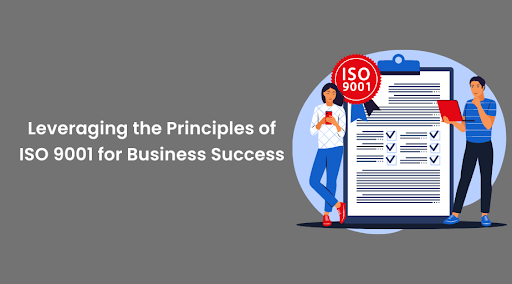Delivering high-quality products and services that consistently satisfy consumer expectations is critical for long-term success in today’s competitive business world. ISO 9001, an internationally recognised quality management system (QMS) standard, provides a comprehensive framework for organisations to achieve operational excellence. Obtaining ISO 9001 Certification shows a company’s dedication to quality and continual progress. Its principles are at the heart of ISO 9001, which act as guiding pillars for successful enterprises. In this blog, we will look at how organisations may use ISO 9001 Principles to create commercial success and preserve a competitive advantage.
Table of contents
- Understanding ISO 9001 Certification and Its Relevance
- ISO 9001 Principles
- Leveraging ISO 9001 Principles for Business Success
- Conclusion
Understanding ISO 9001 Certification and Its Relevance
Let’s discuss the importance of ISO 9001 certification before moving on to the principles. The goal of ISO 9001 is to help businesses establish QMSs that consistently produce high-quality goods and services in compliance with legal and customer demands. It is a vital tool for businesses trying to enhance their performance and reputation since it strongly emphasises ongoing development and customer satisfaction.
ISO 9001 Principles
The ISO 9001 principles provide a solid platform for organisations to achieve operational excellence. The following are the essential principles:
- Customer attention: The notion of customer attention is central to ISO 9001. Organisations must understand and satisfy client expectations while seeking to surpass them. Businesses may promote loyalty and build lasting connections by putting consumers at the centre of their operations.
- Leadership: Effective leadership is critical to the success of a QMS. Leaders must offer clear guidance, create a common vision, and foster a quality and continuous improvement culture.
- Employee Engagement: Engaging employees at all levels is critical to develop a successful QMS. Organisations should empower their employees, give training and tools, and build a culture of cooperation and collaboration.
- Process Approach: ISO 9001 promotes a process-oriented approach to activity management. Organisations must identify, comprehend, and manage interrelated processes to guarantee the efficiency and effectiveness of product and service delivery.
- Improvement: ISO 9001 places a premium on continuous improvement. Organisations should examine their processes, products, and services regularly to discover opportunities for improvement and take proactive initiatives to promote development.
- Evidence-Based Decision Making: ISO 9001 promotes the use of evidence-based decision-making. Organisations should gather and analyse data to support their choices, ensuring they are well-informed and aligned with the organisation’s goals.
- Relationship Management: It is critical to establish and maintain mutually beneficial relationships with suppliers and partners for overall success. ISO 9001 emphasises the value of working together to accomplish common goals.
Leveraging ISO 9001 Principles for Business Success
ISO 9001 principles provide a framework for attaining company success and promoting continuous improvement:
- Businesses may better understand their customers’ wants and expectations by prioritising customer pleasure, which might increase customer satisfaction and loyalty.
- Process-oriented approaches aid businesses in streamlining operations, reducing waste, and better-utilising resources.
- Employee ownership of their work is fostered by including them in the quality management process, which boosts motivation, output, and innovation.
- By ensuring that companies make informed decisions, evidence-based decision-making reduces the likelihood of decisions based on assumptions or incomplete information.
- By adopting the idea of improvement and consistently looking for new ways to satisfy customer needs and improve their services, organisations foster a culture of innovation and development.
- Effective supplier and partner relationship management enhances a seamless supply chain, reliable delivery, and cooperative problem-solving.
Conclusion
Your business will thrive if you use the ISO 9001 principles. Businesses may enhance their operations and deliver high-quality products and services by prioritising consumers, fostering effective leadership, motivating employees, and using a process-oriented approach. Using evidence-based decision-making and developing solid partnerships with vendors and partners further increase overall efficiency and effectiveness. The ISO 9001 accreditation certifies a company’s dedication to quality and provides a roadmap for future growth and commercial excellence. Adopting ISO 9001 standards will increase an organisation’s chances of distinguishing out in a crowded market, exceeding client expectations, and enjoying long-term success.





Be First to Comment